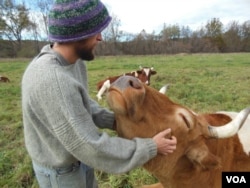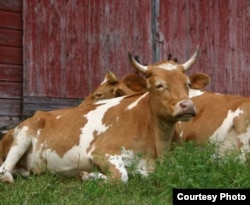Officials at a small rural college in the northeastern state of Vermont have announced their intention to slaughter a beloved pair of oxen which have worked on campus for a decade.
Green Mountain College, known for its courses in sustainable living, plans to serve the oxen meat in its dining hall.
The plan has touched off an international outcry via social media.
End of the road
For a decade, Bill and Lou were a near daily sight working the campus farm. Earlier this year, Lou stepped in a hole and hurt his leg. The injury hasn’t healed. Since oxen work as a team, the 11-year old pair was retired.
Bill and Lou’s big brown eyes, curving horns and gentle but massive girth have made them minor celebrities on campus and beyond. Many say that’s what makes it so hard to believe the college wants to slaughter and eat them.
“These two individuals have become veritable mascots for the school," says Miriam Jones, cofounder of Vine, an animal rescue organization in Springfield, Vermont. "They are the profile picture on the farm’s Facebook page. They are known by name. This is why the outcry has been so significant all over.”
Online petition
A petition to save Bill and Lou on Facebook has attracted over 40,000 signatures from all over the world.
Vine offered to take the oxen to live at its farm for free. Vine’s Pattrice Jones says they were stunned when the college declined, citing sustainability as one of its reasons.
“We do not believe that the way to conserve resources is to kill the elderly and disabled to prevent them from using up resources because they’re not useful anymore," Jones says. "We just ethically find that repugnant.”
Philip Ackerman-Leist heads Green Mountain College’s Farm and Food project.
“We have been very clear from the beginning that this is not a petting zoo," he says. "It was going to be a sustainable farm operation.”
Going to slaughter
Seventy percent of the college's students eat meat, according to Ackerman-Leist.
Twelve years ago, when the college began developing its sustainable farm program, vegetarian students specifically asked that livestock be included to confront the realities of eating meat.
He says the debate goes way beyond Bill and Lou. Faculty and students have spent a great deal of time discussing it.
“It’s something I think about a lot. I actually have 50 head of cattle at home, most of them have names and I interact with them on a daily basis," says Ackerman-Leist. It’s never an easy decision for a farmer to say it’s time for an animal to go to slaughter.”
Philosophy professor Steve Fesmire teaches classes on animal and environmental ethics at the college.
“Sending Bill and Lou to sanctuary can legitimately be regarded as avoiding the issue," he says.
Ongoing debate
Fesmire believes the controversy over Bill and Lou has forced an important discussion on campus and beyond - namely how we feel about the 10 billion other animals that are slaughtered in the United States every year - and how they’re treated.
Andrea Jacques is a junior who plans to study veterinary medicine. She says she agrees with the decision to slaughter Bill and Lou and is surprised at the backlash from people off-campus.
“Most of the students here understand why things are the way that they are,” she says.
Campus officials say meat from the oxen will provide the school with over a months’ worth of hamburger. Jacques says it’s silly not to use it.
“I don't choose to eat hamburger necessarily but if I was, this would be the one that I’d choose to eat, because I know they’ve had a great life compared to some hamburger that you get which may not have had the best life.”
She says if people think there’s something wrong with that, they may want to reconsider their food choices.






